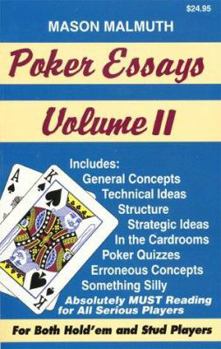Poker Essays
Select Format
Select Condition 
Book Overview
In this follow-up to his first Poker Essays book, poker expert Mason Malmuth shares new insights that separate good players from great players. His bite-sized essays contain illuminating anecdotes and... This description may be from another edition of this product.
Format:Paperback
Language:English
ISBN:1880685159
ISBN13:9781880685150
Release Date:January 2022
Publisher:Two Plus Two Pub.
Length:286 Pages
Weight:1.13 lbs.
Dimensions:0.9" x 5.6" x 8.4"
Customer Reviews
2 ratings
Good reading on poker topics
Published by Thriftbooks.com User , 15 years ago
Mason is a little full of himself, but these essays will help any player to think more deeply about the game and increase the depth of their awareness and knowledge.
Also still very much worth reading
Published by Thriftbooks.com User , 18 years ago
This second collection of Malmuth's essays was also first published in book form in 1996, which means some of the material is definitely dated; nonetheless this book is still very much worth reading mainly because of Malmuth's expertise and thoroughly professional approach to all things poker. Just for the fun of it I will take a more critical approach in this review than I did in my review of his first collection. In an essay entitled, "Is It Better to Be Lucky or Good?" Malmuth ventures that he would rather be lucky. This recalls the old rounder's dictum, usually voiced after a bad run of cards, "I'd rather be lucky than good." Of course the rounders always said that because they figured they already WERE good. Malmuth's somewhat quizzical take is really an excuse to comment on variance and short term luck in poker. The statement "...if you are lucky, you will probably win, and if you are unlucky, the probability is high that you will lose" (p. 33) is actually something of a tautology in that the very concept of being lucky implies winning, while being unlucky implies losing. Malmuth's main point is luck is always a statement about past events. Since each poker hand is an independent event, there is no way of knowing whether one will be "lucky" in the next hand. Lucky people HAVE BEEN lucky. Whether they will continue to be lucky is an open question. It's good here to recall another old rounder's dictum, "I play results." What this means is that when a player has been winning and there is a question as to whether that player has been lucky or good, and you don't have enough evidence to be sure, the judicious course is to assume that the player is good--that is, to base your evaluation of the player on his or her results, not the possible prejudicial reports from other players. Many losers whine about their luck, which means that they often think that the players beating them are just lucky when in fact the losers are getting outplayed. In the essay, "Is a Point Count Worthwhile?" Malmuth argues rather convincingly that such schemes are questionable in hold'em, highly questionable in stud, and possibly of some very limited value in Omaha. The main point he makes is that because point counts don't take into consideration position or the tendencies of the other players, or in stud, information from exposed cards, they can be misleading because the value of your hand changes with the changing circumstances. As Malmuth explains, K9o is a better hand on the button than say T9s if nobody has entered the pot, but not as good if there are several callers already in. By most point count systems they would be about equal in ranking. I developed a point count system many years ago. What I learned (and I think this is something that both Sklansky and Malmuth have missed) is that a point count system can help the beginning player as a guide and as a study aide. Sklansky arranged starting hold'em hands into groups as a guide. Sklansky's s






